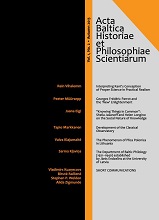Georges Frédéric Parrot and the ‘New’ Enlightenment
Georges Frédéric Parrot and the ‘New’ Enlightenment
Author(s): Peeter MüürseppSubject(s): History of ideas, History of Education, 18th Century, 19th Century
Published by: Tallinna Tehnikaülikooli õiguse instituut
Keywords: blunders of the philosophes; Enlightenment; Georges Frédéric Parrot; history of the University of Tartu; Nicholas Maxwell; scientific knowledge; wisdom;
Summary/Abstract: Georges Frédéric Parrot (1767–1852), the first Rector of the University of Tartu (Dorpat) after it was reopened in 1802, was a son of the French Enlightenment. He considered it his mission to implement these ideas in the context of the new university. One of the foci of his activities was arranging the university according to a new type of statutes endorsing free development of all kinds of branches of science in the framework of the so-called ‘Academic Republic’, which would be no longer dominated by theology. Parrot was successful in his pursuits. The University of Tartu became an outstanding centre of astronomy, mathematics and natural science—the fields Parrot himself was actively involved in. Today, the term Academic Republic is becoming more and more frequently used by the university employees again. The emphasis on the role of natural science, which was one of Parrot’s main ideas, caused the need for a New Enlightenment. This is the term invented by Nicholas Maxwell, the British philosopher of science. Although the focus of Maxwell’s New Enlightenment seems to be much narrower than that of the classical one, the final goal is still the same. According to Maxwell, making physics the science proper, the basis of constructing serious academic knowledge, has caused the concentration of research on the quest for some kind of special knowledge, the scientific one. Everything stops there. We have lost sight of the general goal of serving humanity, looking for solutions to actual grave problems that Homo sapiens is facing today. Obviously, to serve the whole humanity was the basic goal of the “original” Enlightenment as well. We have to restore the view of the so-called philosophes concerning the position of social science in the academia. It is social science (and the humanities) that form the basis for the understanding and solving the problems that are of real importance to human life.
Journal: Acta Baltica Historiae et Philosophiae Scientiarum
- Issue Year: 1/2013
- Issue No: 2
- Page Range: 15-25
- Page Count: 11
- Language: English

